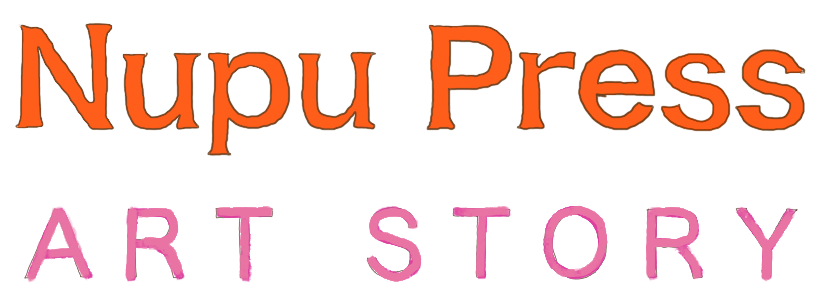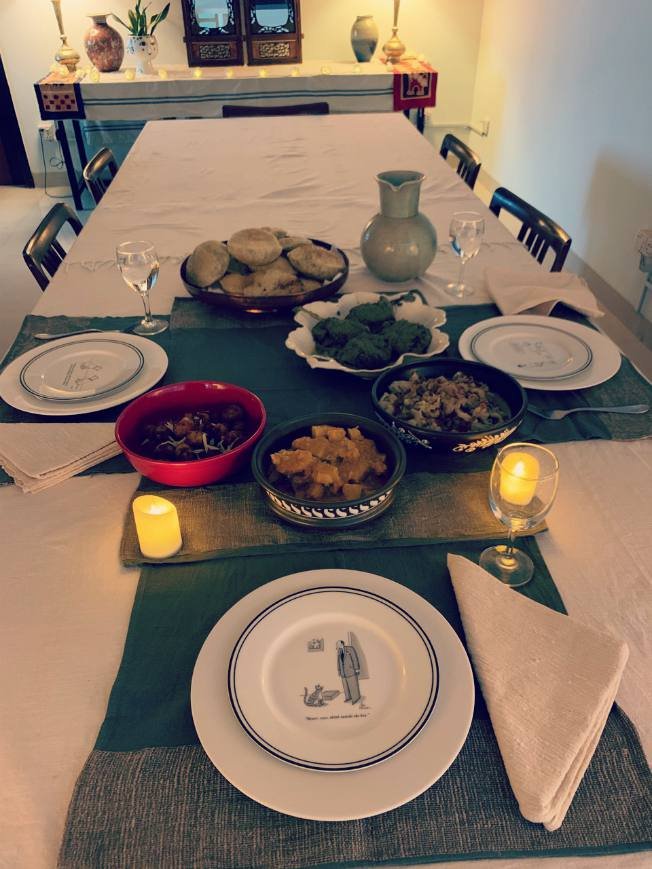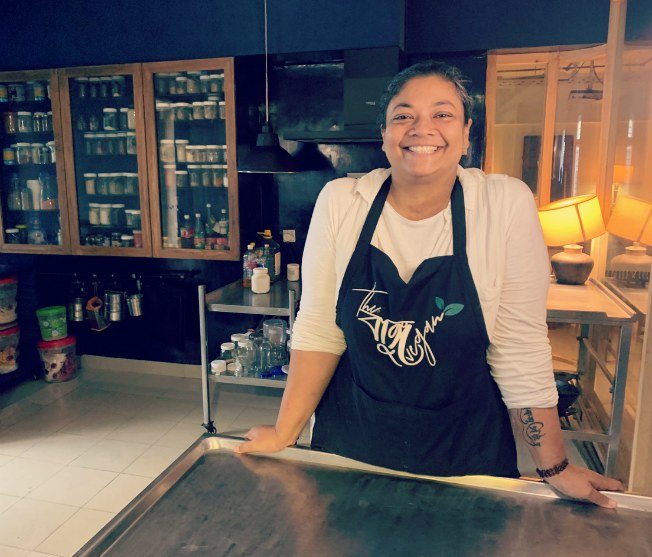Inspire Me: Rubaiya Ahmad
Rubaiya at Bangu Vegan. The premises were designed by Rubaiya's sister, Saba Ahmad.
Rubaiya happens to be my cousin though that’s not the reason for this post. I have written of her animal welfare advocacy (available in my book).
She continues to head Obhoyaronno (‘sanctuary’ in Bengali), an organisation she founded in 2009 that helped to update a 100-year-old Animal Cruelty Act in Bangladesh, and turn Dhaka into a no-cull city, while also setting up the country’s first – and to this day, only – spay-neuter facility, which has vaccinated and sterilised over 17,000 dogs to date.
She is a true pioneer and inspiration. I remember her saying two years ago that in her dream parallel life, she’d be cooking vegan food all day long. Less than a year later, she’s doing just that.
She began a second career in 2019 as a vegan chef, caterer and advocate for which she set up a new company, Bangu Vegan. It is on this topic that I grilled her recently when my sister and I visited Bangu Vegan’s premises in Dhaka. With its high-end professional kitchen combined with a cosy dining area (more on her occasional supper clubs later), it was like being invited over for a home cooked meal, albeit an extraordinary one.
We feasted on 14-spice aloor dom (potato), kochu (taro root) in coconut milk and lemongrass, cauliflower korma in cashew cream, eggplant with mustard and poppy seeds, pea pilau, and puris (deep fried unleavened bread) with green peas. Plus vegan brownies! Our stomachs exploded with happiness.
So you born and brought up in Dhaka. You then went to study in the United States at what age?
I was 19. It took me forever to graduate because I kept changing my major. I started off as pre-law, then switched to music, then to biology. My mother said she’d kill me or she’d kill herself, so I finally forced myself to stick to something. I graduated with a Bachelors in IT [Information Technology].
The thought of you in IT is hilarious...
I worked as an IT consultant for six years in the US to pay off my student loans. My education was in Texas but I had to keep moving for work. I worked in Arkansas, Kentucky, Michigan, New York and then Indiana. Once my loans were paid off, I had no reason to stay on in the US, and I moved back to Bangladesh.
Was there any indication when you were young that you would end up being a chef?
I remember trying to make noodles at age eight. My father would say the nicest things about my attempts. That’s my earliest memory of cooking. But I never saw myself as someone who cooked and I still don’t have that confidence. Whenever I do, I watch everyone’s faces to make sure it’s good.
With elder sister Sumaiya. Rubaiya is on the right.
In your childhood, did you have any concept of what veganism or vegetarianism meant?
No, not at all. There was no understanding of it. Our culture didn’t really teach us what to eat, so when I was on my own, I ate what tasted good, and what everyone else around me was eating.When I lived in the US, my diet was all-American: I’d eat sausages for breakfast, burgers for lunch, and pizza or Philly cheesesteaks for dinner. I was so sick all the time.
Fast food is advertised so aggressively, you can’t avoid it – you’re told it’s accessible, it’s cheap, that it brings people together.
Yes, and it never even occurred to me I shouldn’t be eating it. I don’t mean from a vegetarian perspective, but just as unhealthy junk food. It took me a long time to even question what I was eating and why I felt the way I felt.
It was actually you who put the idea in my head of going vegan; I remember telling you I was vegetarian, and you said, ‘Well, eventually you’ll go vegan, right?’ I never thought about it before that because I was happily chugging away milk and cheese and the rest of it. So I started to wonder why veganism and vegetarianism are so different from each other.
How long has it been now?
I was vegetarian for 11 years (though I cheated frequently in the first few years), and I’ve been vegan for another three.
How did you start Bangu Vegan?
Through Obhoyaronno, we started a campaign in 2014 to promote Meatless Mondays. That was a global campaign we were trying to bring into Bangladesh. It did quite well, and we were able to recruit a number of the largest private schools in Dhaka to do this.
But I felt we hit a wall. Even if all the schools and all the universities do Meatless Mondays, is that enough? Is that getting the point across? I would give talks at various events, and people would be really encouraged and they’d ask, ‘Where do we get vegan food? How do we learn how to do this?’ And I had no answer for them. There was absolutely no place in Dhaka where you could get vegan food.
My friend Jo-Anne put me in touch with a donor (who wishes to remain anonymous). I had a two-hour phone conversation with him and told him about Meatless Mondays. He said, ‘Why don’t you start a business?’ I said no, because it felt too big a job to take on. He said, ‘Oh, you’re a chicken!’ Of course, I thought – I’m not a chicken! He gave the money to set this up in Bangladesh.
Photo: Rahul Sehgal
What was the original agenda?
It was vegan advocacy through food. At Obhoyaronno, whenever we mentioned anything on social media about veganism – even when related to animal welfare or the environment – we’d be trolled.
When we opened Bangu Vegan, I made it a point to not do vegan advocacy the way it’s usually done. I wanted people to experience good vegan cuisine, because that’s the first block. When you tell people about going vegan, they think it means no more burgers or pizza, that it’s going to be only salads from now on.
But if you like biryani, then mushroom biryani is really just as delicious. Then they can see that this good food is also doing good things for their health, for the environment, for animals.
Because I ate meat for such a long time, I sympathise with people who have different eating habits. I know if you’re not exposed to vegan food, you don’t understand it, and you don’t want to hear about it. If someone had told me, ‘It’s horrible what you’re eating, and why are you killing animals’ then I would totally block them out. So we try to take a soft and compassionate approach to our advocacy. I must admit I also lose my cool at times.
What kind of services do you offer now?
We do catering and dining-in services, which are supper clubs and private parties. In the beginning we were kind of lost in terms of the cuisine we wanted to offer. So we were doing a lot of burgers, sandwiches and wraps. We wanted to offer alternative to the favourites. But it became a little boring for me.
It was Bangu Vegan after all, and Bengali food in essence has actually been vegan – all the bhortas [vegetable mash], rice and vegetables. Mughal cuisine came much later.
My mashi-ma [family friend] Santa Mukherjee helped me a great deal because every time I’d eat at her home [in Kolkata, West Bengal, India] and marvel at the food, she’d say, ‘these are all Bangladeshi recipes.’
A lightbulb went off and I decided to focus on that. Some customers want burgers and wraps, but our branding is now Bengali vegan food. And for recipes that aren’t vegan, we’ve veganised those as well. It’s really exciting – there are endless possibilities.
There are so many varieties of spinach alone in Bangladesh. There are many kinds of kochu (taro root), which is a great meat alternative. Jackfruit has become a world-famous meat alternative, and jackfruit is our national fruit! When they’re in season, they’re available everywhere and they’re cheap. Vegan food doesn’t have to feel like a foreign concept, like quinoa or chia seeds.
Can you explain how you set up a supper club?
I design a menu then we advertise it on social media – this menu on this day, supper for 12 people. They can buy tickets for however many seats they want – two, four, whatever. We only cook just enough for the confirmed seats to minimise wastage.
We usually lay out the food as a buffet. The last time we had one, there was a few groups of four, and there were some couples. They didn’t know each other, and they all got talking around this communal table, which was nice.
We try to do the supper clubs once a month, though sometimes we can’t because the catering orders have picked up. I don’t have to host those, so that’s easier.
Table where buffet is usually laid out.
When you create a menu, what’s your inspiration?
What’s in season and what’s locally available. It often includes some new vegetables I’ve learnt to eat, so it’s always changing. We try to have different flavours – something tangy, something bitter, something spicy, something mild. We also try to find a meat alternative – jackfruit, mushrooms, kochu, banana stem flower, or soy. We combine various textures too, and it works well.
We lay it out based on the flavours, starting with the mild and going to the strong. We encourage people to take one thing at a time, taste it, and then move on to the next one.
How do you want your guests or clients to feel when they eat your food?
Surprised that vegan food could taste this good! I never get tired of hearing that, because that’s the number one goal. I like offering items they eat daily but with a twist – eggplant with poppy seeds, or kochu with lemongrass. I also want people to believe that they can do this themselves, that it’s not difficult.
Is cooking for you an intellectual, emotional or spiritual experience?
It’s all of them. I cook badly when I’m upset. You can taste it in the food, just as you can taste it when it’s been cooked with love. So you have to be your best self when you’re preparing food.
I hadn’t realised until you told me, but there is a virtue of working with your hands. It’s definitely therapeutic for me and helps with anxiety to do something with my hands. I could be chopping something while processing something in my head – though I chopped into a finger that way once.
Photo: Mahrukh Mohiuddin
Is cooking for yourself very different?
Oh yeah. I’ll cook gourmet food all day long and then eat instant noodles.
I knew a landscape gardener who did beautiful things with other people’s gardens but his own was hideous. Has it become a double-edged sword that you’re feeding everyone else really well but not so much yourself?
When I’m cooking, I’m tasting the food throughout the process. But I’m not sitting down to eat it, so even if I’ve eaten enough for three meals, it doesn’t register. So I always eat after the event is over and, most of the time, I just put together a bowl of oatmeal or instant noodles.
For people who want to eat less animal products, what do you advise?
I tell them not to take the all-or-nothing approach. I see a lot of people want to go vegan after Qurbani Eid (annual religious festival for which animals are slaughtered), which is what happened with me as well. They feel really disgusted with what they see but of course the memory fades, then they go back to eating meat.
This is why Meatless Mondays is so important – we ask people to eat vegan or vegatarian only once a week. From Mondays, see if you can add another day like it. Then try three days a week. Then four. Most people go cold turkey and they can’t sustain it.
We also tell people: don’t feel you have to put a label on it: ‘I’m vegan’, or ‘I’m vegetarian’. Just do what you can. Even if you’ve told yourself you’re vegan from today, and in a week’s time, you find yourself eating some cheese, then just eat the cheese and move on to a cheese-less meal the next day. It’s always a gradual process.
People shy away from it because they think they can’t handle the pressure – they think, what will happen when I go to a dinner party? But actually nobody notices anything until you point it out. Though, weirdly, once you say it, everyone then tries to insist you eat meat.
Yes! When I was vegetarian, if I announced it, some people went out of their way to try to make me feel awkward and ungracious for not eating their food.
When I go to weddings, people will ask – have you eaten? And I just say yes. I don’t want to say, ‘You’re serving biryani and I don’t eat meat!’ Nobody has the patience, and nobody cares. So I’ve stopped doing that.
But people are aggressive towards vegans. Vegans are always made fun of. There are so many jokes about vegans. Like: ‘how do you know when someone’s vegan? Don’t worry, they’ll tell you.’ But it’s actually the other way around. If you say anything about being vegan, they’ll make a point to attack you, to ridicule you.
(From my sister:) I think people think it’s an implicit rebuke of themselves. My daughter [who’s vegan] always says, ‘I’m not making judgment on what you’re eating, so please don’t make it on mine’.
Yes, they either feel uncomfortable eating in front of me, or they get defensive and poke fun at me. I had a fight with friends when they wanted to bring meat into this facility and I wouldn’t allow it because I have to maintain these premises as vegan.
I constantly have to negotiate with everyone – even my family – after all these years. When we have a family meal, someone ‘jokingly’ will say, ‘Oh, you don’t know what you’re missing’. Well, I do know! I ate that way for 30 years! I choose to miss out on this. Just let me have my broccoli in peace.
Useful wall art of cups at Bangu Vegan
Are there any flavours you think help with the transition?
Umami, which you can find in mushrooms, Marmite, Vegemite, and nutritional yeast, although that’s not available locally. Bengalis like spicy food. And it’s good to have something that has some heft. If you cook jackfruit, banana stem, banana flower or soy the right way, they can taste very much like meat.
What are your thoughts on faux meat?
I know people who’ve stopped eating meat and it repulses them that these products taste and look exactly like meat. They can be good products for someone transitioning, but we don’t promote them as much because we want to encourage people to eat whole food.
(From my sister, the scientist:) What about growing meat in the lab? It is actual meat but there are no animals involved.
I’m all for it, and in 30 years’ time, that’s the future of meat. It won’t involve deforestation or animal cruelty. I won’t eat it because it’s grown from animal tissue and it’s still animal to me. Not because of cruelty but because I’ve lost the taste for meat. I’m a big advocate of whatever gets people to move away from eating animals.
My goal is to be plant-based – avoid all processed foods and only eat real food.
Yes, because you can still be a shitty vegan. You can still give yourself cancer from eating horrible, processed vegan food. There’s a term for this: retail vegan. Retail vegans eat mockmeat sausages and chips, so it’s still a shitty diet. If you’re this kind of vegan because of animal cruelty, then you’re being kind to animals, but you’re not being kind to yourself.
Also, those processed packaged vegan foods are not environmentally any better. And the big corporations are still making money off of you just as MacDonald’s is.
That’s why I like people who promote not just veganism but also whole food. When I eat that way, I feel my best. When I eat pasta, even though it’s vegan, I don’t feel my best. The less processed food we eat, the better it is for us, for the planet, and everything else.
Finally, which ingredients do you find essential for a vegan kitchen?
It depends on which cuisine you’re cooking, but for Bangu Vegan, it’s coconuts and mustard seeds. We always have freshly grated coconuts, fresh coconut milk, and whole coconuts. And mustard just makes life better.
Rubaiya photo: Manzoor Alam Beg
Bangu Vegan may be contacted here.
‘Understanding someone’s suffering is the best gift you can give another person. Understanding is love’s other name. If you don’t understand, you can’t love.’
— Thich Nhat Hanh
Rubaiya Ahmad Recommends
book
The Little Prince. ‘It is only with the heart that one can see rightly: what is essential is invisible to the eye.’music
Case of You by Joni Mitchell. Because I wrote that song in my past life (as a musician) and then Joni took credit for it ;)film
Earthling – for turning me vegan.












